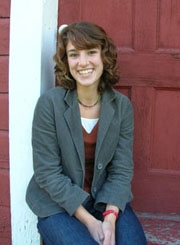Alison Brady investigates Vermont dairying

MIDDLEBURY, Vt.- Alison Brady grew up in the dairy country of Wisconsin. Now a senior at Middlebury College in Vermont, she is investigating how regional cooperative efforts in New England, together with federal and state governments, have affected Vermont dairy farmers from the Great Depression to the present day.
“Despite coming from a huge dairy state, farmers from my part of the country in Wisconsin suffer, in ways similar to Vermont dairy farmers, from variations in milk supply and demand as well as imperfect pricing systems,” Brady said. “I’ve always had dairy-related issues in the back of my mind, both living in Wisconsin and since I moved to Vermont four years ago. I really do love the dairy culture in these two states, so my natural tendency is to want to do something to protect and help dairy farmers in both places.”
Brady, a history major, originally intended to make her project an overview history of dairy farming in Vermont, but her studies stimulated an evolving interest in the modern-day effectiveness of dairy policy. She has turned her focus toward the formation of dairy cooperatives in Vermont, and the impact they have had on the industry. By researching organized efforts such as the Northeast Dairy Compact Commission, a congressionally authorized commission from 1997 to 2001 that set price floors for beverage milk, she hopes to gain a broader view of what governmental and cooperative efforts have done to stabilize the dairy supply and enhance farm prices for Vermont dairy farmers. She will look at several pricing approaches that are part of federal policy, such as dairy price supports, federal milk market orders for pooling milk and deciding how it should be best used for market, and price discovery mechanisms, which help decide how much farmers should be compensated for the milk they supply annually.
To conduct her research, Brady received a 2005-2006 Middlebury College Academic Outreach Endowment Grant for Service-Learning from the college’s Alliance for Civic Engagement office. The grant will help cover costs for several endeavors related to her study, including travel statewide to interview longtime dairy farmers, extension agents, local milk product manufacturers, educators and agricultural policy-makers. In addition, she is designing and hopes to mail a two-page survey to as many as 500 Vermont dairy farmers, and is making plans for an educational exhibition booth for youngsters.
“Alison focused her initial research on the dairy herd buy-out of the late 1980s and its consequences. By combining a study of the Vermont dairy industry and the relationship between dairy farmers and their communities, she hopes to contribute to a better understanding of the industry’s problems, and suggest guidelines for the future,” said Middlebury College Professor of American History Travis Jacobs, who is Brady’s academic advisor. “It’s an excellent example of a service-learning project and academic outreach.”
With Jacobs’ help, Brady is building a network of contacts in the state’s agricultural community. She consults with agricultural economist Ken Becker, who was raised on a dairy farm outside Albany, New York, and is now a lecturer on dairy economics and co-director of the Master of Public Administration Program at the University of Vermont; his extensive experience in micro-economics and the implementation of agricultural policy has helped Brady understand current policies that affect Vermont dairying.
“It’s exciting to work with someone like Alison, who is interested in the dairy industry and understands that it’s an essential part of regional history,” said Becker. “She has amazing motivation for the project and is willing to stretch all envelopes to get what she needs.”
Brady’s survey will be designed to encourage farmers to share their family histories and dairying anecdotes, viewpoints on why they farm and whether or not they plan to continue, and personal perspectives and concerns about Vermont’s dairy future.
Next June, Brady plans to participate at the state’s Vermont Dairy Day, an annual celebration held in the capital city of Montpelier. The event targets young students and offers educational outreach, team games and other activities, and a sampling of Vermont dairy products. Brady will create an educational exhibit for the fair day, and offer information on various aspects of Vermont dairying. As part of her exhibit, she hopes to introduce “Cow Bingo,” a game featured at a Wisconsin celebration called River Falls Days, held annually in her hometown.
“If at the end of this project my research has given something helpful to dairy farmers, dairy cooperatives, and others who work with Vermont’s dairy industry, then I would feel as though I had accomplished my initial goal,” said Brady. “Dairying is really important to Wisconsin, too, so it would be great if I could apply my research and knowledge from this project somehow back home.”
—end—

